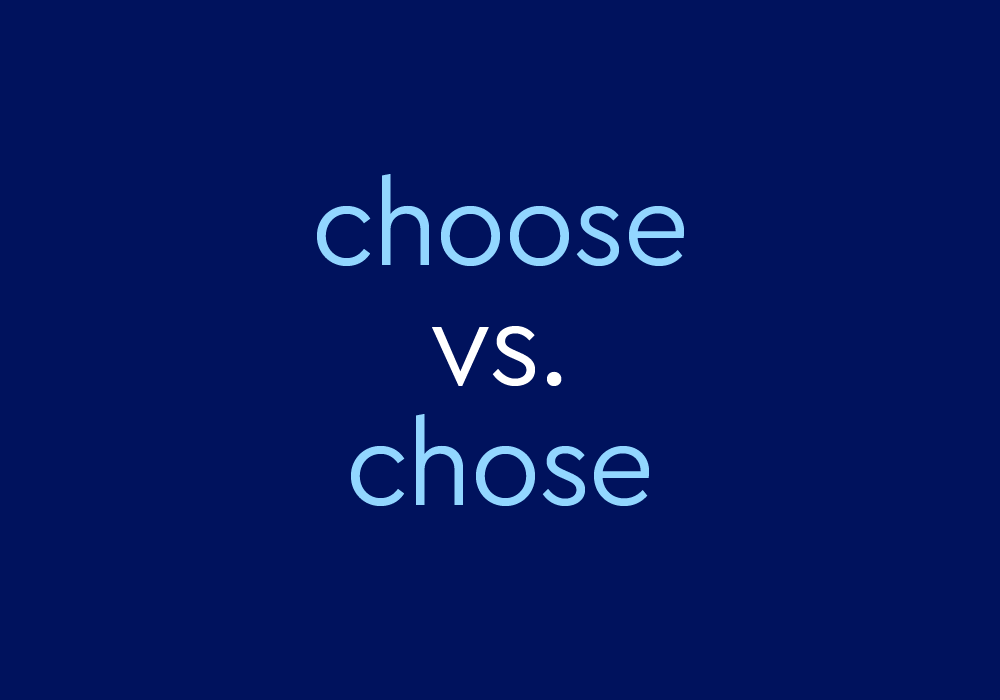The fundamental difference between these two words is a matter of time: "chose" is for the past, while "choose" is for the present and future. "Choose" is the present tense form of the verb, "chose", and it refers to the act of selecting or making a decision among various options. Understanding this distinction is crucial for effective communication. Selecting the appropriate form ensures that you convey the precise timing of a decision or choice accurately in both spoken and written English.
When do we use chose?
"Chose," conversely, is the past tense form of the verb "choose." It comes into play when discussing decisions or actions that have already transpired in the past. It signifies that a choice was made at a specific point in time before the present.
Example sentences
- She chose to pursue a career in medicine after finishing her degree.
- They chose the beach as their vacation destination last summer.
- Certainly, here are eight sentences using the word "chose":
- She chose to pursue a career in medicine because she wanted to help people.
- Despite the tempting dessert menu, he chose to order a healthy fruit salad.
- When faced with two job offers, he chose the one that offered more growth opportunities.
- The team captain chose to forfeit the game due to unfavorable weather conditions.
- Sarah chose to study abroad in Italy to immerse herself in the culture and language.
- After hours of deliberation, they chose the blueprints for the new office building.
- He chose to volunteer at the local animal shelter because of his love for animals.
- When it came to naming their newborn son, they chose a traditional family name.
The fundamental difference between these two words is a matter of time: "chose" is for the past, while "choose" is for the present and future. Understanding this distinction is crucial for effective communication. Selecting the appropriate form ensures that you convey the precise timing of a decision or choice accurately in both spoken and written English.
When do we use choose?
"Choose," which is the present tense form of the verb, is used when referring to the act of selecting or making decisions among various options. It denotes the ongoing or future process of making a choice.
Example sentences
- I have to choose a new smartphone from the available models.
- Can you help me choose a gift for her birthday?
- Certainly, here are eight more example sentences using the word "choose":
- As a vegetarian, I often choose plant-based alternatives for my meals.
- It can be challenging to choose the right outfit for a job interview.
- When you travel, you have the opportunity to choose from a variety of cuisines.
- The team will choose a captain for the upcoming soccer season.
- She couldn't decide, so she asked her friend to choose a movie for them to watch.
- It's essential to choose your words carefully when giving a public speech.
- When shopping for a new smartphone, consider your needs and budget before choosing a model.
Common idioms/phrases
- Pick and choose: This idiom means to carefully select or choose from a variety of options.
- For example, "You can't just pick and choose your responsibilities; you have to do them all."
- Chosen few: This phrase refers to a select group of people who have been carefully chosen or selected for a particular purpose.
- For instance, "The chosen few were invited to the exclusive event."
- Choose your battles: This means to decide when to engage in a conflict or argument and when to avoid it. It suggests that not every issue is worth fighting over.
- For example, "I decided to choose my battles and didn't respond to his rude comment."
- Chosen one: This phrase often appears in literature and movies and refers to a person who has been selected for a special destiny or purpose.
- For instance, "Harry Potter is the chosen one who will defeat Voldemort."
- Take your pick: This means to choose from a selection of options.
- For example, "There are several desserts on the menu; you can take your pick."
- The chosen path: This phrase is used to describe the specific direction or route someone has selected in life or in a situation.
- For example, "She decided to follow the chosen path of pursuing a career in medicine."
- Chosen profession: Refers to the career or occupation that someone has selected or decided to pursue.
- For instance, "Teaching was her chosen profession, and she loved every moment of it."
- Choose sides: This means to make a decision in favor of one person or group over another in a dispute or conflict.
- For example, "During the debate, he had to choose sides and support one of the opposing arguments."
Practice Questions
- Can you help me chose/choose a suitable gift for her birthday?
- When you go shopping, remember to chose/choose items that you really need.
- I will chose/choose the blue shirt because it matches my jeans perfectly.
- It's important to chose/choose a career path that aligns with your interests and skills.
- Every morning, I have to chose/choose between coffee and tea for breakfast.
- Last weekend, she chose/choose to visit the art museum with her friends.
- He chose/choose the red car out of all the available options at the dealership.
- Despite the rainy weather, they chose/choose to have a picnic in the park.
- When he was in high school, he chose/choose to learn how to play the piano.
- She chose/choose the most challenging book on the shelf to improve her reading skills.
Answer
- choose
- choose
- choose
- choose
- choose
- chose
- chose
- chose
- chose
- chose
Discover more about the AI English proofreader, Engram!

Reference














